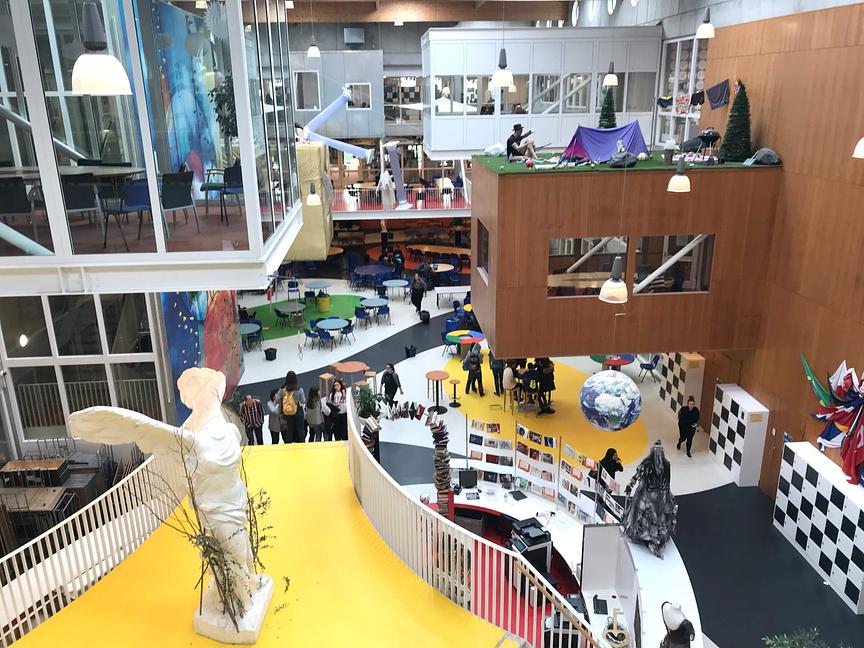The basics...
At Agora, we believe that school has to be a good mix between:
Harvard University ...a place where all the knowledge of the world is within reach.
A Buddhist monastery ...where you feel comfortable and at ease andwhere you discover what is valuable to you in life.
A creative laboratory ...where you can make and try everything you can imagine: painting, welding, graphicdesign, 3D printing...from cooking to programming to making a robot: if you canimagine it, you can make it.
A marketplace …where you can see new things, meet and inspire each other, debate and interact.
Disneyland …a place where you feel happy, amazed and above all: welcome, supported andchallenged by the staff!!
A day at Agora
At Agora we have a simple daily structure. Within this structure, your coach teaches you to plan your challenges and other activities. Coaches start at 8 in the morning. Students start at 9 with a ‘dagstart’ (start of the day). This takes half an hour, and it’s all about interacting with other students about working together, or for instance debating about topical subjects.After the ‘dagstart’ everybody has their own agenda. After the lunch break, we have half an hour of silence, so everybody can do their obligatory reading. Most of your days end at 3pm. It’s possible and sometimes necessary to stay longer for instance to visit physical education.
Agora
> We start with you. What do you want to learn? What are your talents, interests, and ambitions? You can use everything in the world that’s worthwhile to investigate, make or develop as your personal starting point for learning. Your personal coach will support and supervise your learning process. At Agora we traded courses, timetables, classes, and tests for challenges, collaboration and coaching by teachers.
> Challenges are your personal questions, problems, things you want to learn or know, research or make. To start a challenge you have to be well prepared. Good preparation is half the battle. You and your coach decide what the end result of your challenge will be and answer questions like: What are you going to learn during this challenge? Who are you going to collaborate with to achieve a great result? How long will your challenge take? Of course if necessary your coach and other students will be there to help you with this.
> After your preparation, you present your plan for your challenge. During this presentation, you explain who might be able to help you in the various stages of the challenge to come. You explain where and how you expect to get information and knowledge. If this goes well you can start your challenge. During this execution phase, you keep track of your progress. You write down how you found information and which information you found where and how. If you’re making something you can also add pictures or videos to show and explain the progress. You, for instance, explain the difficulties and problems you encountered. You also explain how you overcome them. And of course, you write down what you want to achieve tomorrow.
> At the end of the challenge you present your end product. There are lots of ways to do this. You can make a video, a sculpture or painting to show off what you learned. Maybe you will invite us to come to a stable because you want to show us what you learned about horses in practice. Your parents, other students, and your coach are all invited for your presentation.
> After this, you have a ‘review- talk’ with your coach. You reflect on how your challenge went, which skills you improved and how you can use these during your next challenge.
Personal workspace and coach group
Your coaching group consists of a maximum of 17 other children of different age and levels. At your coaching group you have a personal workspace which you can arrange to your own taste. This means there is no walking to a different classroom every 50 minutes, instead you work at your personal workspace. Do you like variety? We also have rooms to collaborate and have meetings in. We even have silence rooms, where you can study in silence. We have workspaces where you can cook, do carpentry, painting, metalworking, or program a robot, etc. We also have volunteers who offer inspirational sessions which you can join, and we love it when you visit people and companies outside our school.
Student, coach, and course expert
At Agora you as a student have a personal coach. The two of you make your personal learning plan. Making adjustments to this plan is a continued process. You are in a coaching group with 17 other students and a coach. At least once a week you have a talk with your coach. Aside from this ‘official’ talk you see and talk to your coach every day because you are in the same room every day. When you have been at Agora for a couple of years and start preparing for the national exams you start working with our subject experts. They are teachers who support you for a specific subject.
Parents
Parents have an important role at Agora. We expect them to help on a voluntary basis. This could be anything, like helping in one of our workplaces (kitchen, carpentry, makerspace etc.). Or helping us by driving students to places they want to visit. Lots of parents offer internships, give workshops or inspiration sessions on their personal hobbies, interests, passion or occupation. Parents share these personal hobbies, interests, passions, and occupations with our students. This is great because schools can’t be experts at everything.



